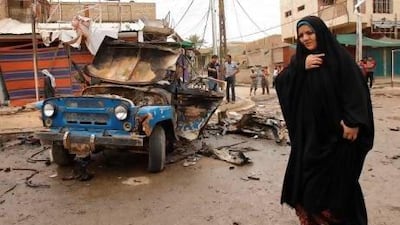BAGHDAD // Prime minister Nuri Al Maliki said yesterday he will overhaul Iraq's security strategy as a two-day wave of violence killed at least 86 people, including 24 police, bringing the month's death toll from unrest to 352.
"We are about to make changes in the high and middle positions of those responsible for security, and the security strategy," Mr Al Maliki said at a news conference in Baghdad, adding that the issue will be discussed in a cabinet meeting today.
"I assure the Iraqi people that they (militants) will not be able to return us to the sectarian conflict" that killed tens of thousands of people in Iraq in past years, he added.
The worst of yesterday's violence took place in Baghdad, where ten car bombs ripped through open-air markets and other areas of Shiite neighbourhoods, killing at least 48 people and wounding more than 150, police officials said. In the bloodiest attack, a parked car bomb blew up in a busy market in the northern Shiite neighbourhood of Shaab, killing 14 and wounding 24, police and health officials said. The surge in bloodshed has exasperated Iraqis, who have lived for years with the fear and uncertainty bred of random violence. "How long do we have to continue living like this, with all the lies from the government?" asked 23-year-old Baghdad resident Malik Ibrahim. "Whenever they say they have reached a solution, the bombings come back stronger than before." "We're fed up with them and we can't tolerate this anymore," he added.
Iraq is home to some of the holiest sites in Shiite Islam and is visited by hundreds of thousands of foreign pilgrims every year, most of them from neighbouring Iran.
Five Sahwa anti-Al-Qaeda fighters were also killed and 19 wounded in three separate attacks north of Baghdad.
The Sahwa are made up of Sunni Arab tribesmen who joined forces with the US military against Al Qaeda from late 2006, helping to turn the tide against the insurgency.
And a car bomb killed one person and wounded four in Rutba, a town in Anbar province, west of Baghdad, while a roadside bomb in the northern city of Mosul wounded three people.
The violence comes after 24 police were killed overnight.
Police said security and soldiers carried out a joint raid to free kidnapped police officers in Anbar province, west of Baghdad, but clashes ensued. Twelve kidnapped policemen were killed and four wounded, although it was not immediately clear if they were caught in crossfire, killed by their abductors, or a combination of the two.
Mohammed Hadi, one of the wounded policemen, said they had been abducted on the highway between Baghdad and Jordan on Saturday.
In Haditha, a town in Anbar province, gunmen attacked a police station, killing eight police, among them two officers. And gunmen killed four police and wounded three in an attack on another police station in the town of Rawa, also in Anbar, said Qais Al-Rawi, head of the area's local council.
Gunmen also killed a shop owner in Mosul on Sunday. The security situation in Anbar, home to two of the main centres of Sunni anti-government protests that broke out almost five months ago, has deteriorated sharply.
On Saturday, security forces tried to arrest Mohammed Khamis Abu Risha, who is wanted in connection with the killing of five Iraqi soldiers near Ramadi, west of the capital.
But the bid to arrest Mr Abu Risha, nephew of a powerful tribal sheikh who is a key supporter of Sunni anti-government protesters in Anbar, sparked clashes with tribesmen in which two of them were killed.
Hundreds of gunmen then gathered in the area of the Anbar Operations Command headquarters near Ramadi, but later withdrew, police said.
Officials also reported kidnappings of people including security forces in Anbar on Saturday, though they gave differing figures for how many were seized. Tensions are festering between the government of Maliki, a Shiite, and Sunnis who accuse authorities of marginalising and targeting their community, including through wrongful detentions and accusations of involvement in terrorism.
While the government has made some concessions aimed at placating the protesters and Iraqi Sunnis in general, such as freeing prisoners and raising the salaries of Sunni anti-Al-Qaeda fighters, underlying issues have yet to be addressed.
*Agence France-Presse with files from the Associated Press

